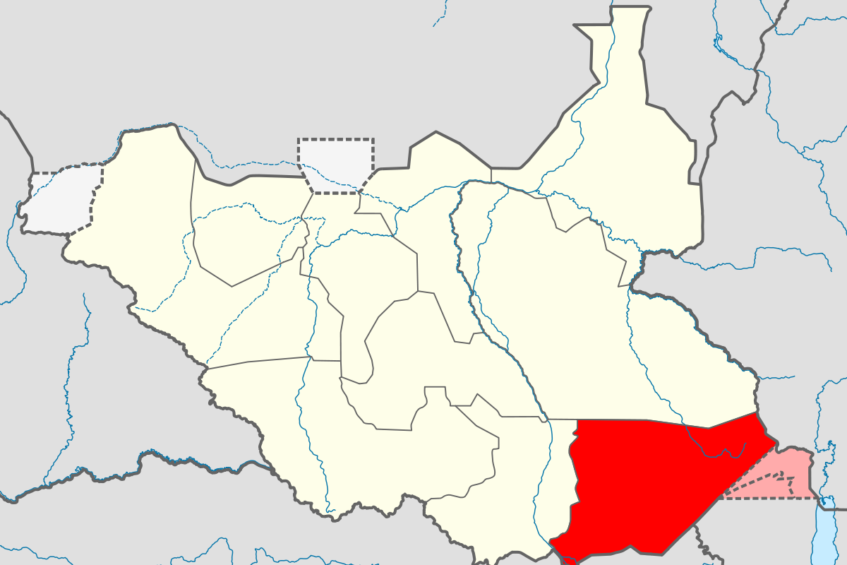
Map of Eastern Equatoria State. (Courtesy).
Kenya was given a temporary presence at the Nadapal area of South Sudan’s Eastern Equatoria State, a 2009 joint ministerial meeting between then Southern Sudan and Kenya shows.
The ministerial meeting on the management of the common border between Kenya and Southern Sudan stated that Kenya will establish a temporary border control post at Nadapal.
“The (Kenya) border control post, (to be established) adjacent to the existing South Sudan border control post (is) to facilitate movement of people, goods, and services between the two countries,” reads the document.
The meeting was attended by six former Southern Sudanese ministers and heads of missions, and eighteen Kenyan officials.
The institutions present in the meeting were the Ministry of Foreign Affairs, the Ministry of Regional Cooperation, the Ministry of Internal Affairs, and the government of Eastern Equatoria State.
However, it was agreed that “the establishment of the temporary border control post does not in any way amount to delimitation or demarcation of the international boundary between Kenya and then Sudan or any part thereof.”
The two countries agreed that a technical team will be established to demarcate the actual boundary between the two countries at an appropriate time.
The parties also agreed on strengthening collaboration in the security issues and protection of rights and civil liberties of the citizens of both countries.
However, it is not clear whether the consensus meeting is still valid or not.
Fresh border tension
On February 6, 2023, authorities in Eastern Equatoria State reported intense fighting in Kapoeta East between the Toposa communities and armed men from the Turkana tribe in neighboring Kenya.
The clashes erupted a few days after hundreds of Kapoeta East residents protested an alleged encroachment by Kenyan troops in the area.
The youth had called on the government in Juba to intervene and engage Nairobi to resolve the issue.
But a day later, armed Toposa youth in Nadapal mobilized and staged an attack on the Turkana cattle herders for allegedly camping on the South Sudan side.
On Wednesday, President Salva Kiir met with Eastern Equatoria State Governor Louis Lobong to discuss the security situation in the area.
The governor told the media that a Joint Border Committee has been established to engage Kenyan authorities and the local communities to resolve border tension between the two countries.
The Ilemi Triangle
The trespass on the Ilemi triangle by nomadic tribes from Kenya, South Sudan, and Ethiopia is not a new phenomenon.
The territory, which derived its name from the Anyuak chief Ollemi, is claimed by South Sudan and Kenya.
The territory also borders Ethiopia and, despite the use and “trespass” into the triangle by border tribes from Ethiopia, the Ethiopian government has never made any official claim on the Ilemi.
According to reports, Ethiopia agreed that the land was all Sudanese in 1902, 1907, and 1972 treaties.
The dispute with Kenya reportedly arose from the 1914 treaty in which a straight parallel line was used to divide territories that were both parts of the British Empire.
Over the years, the Turkana nomadic herders have continued to move to and from the border and traditionally grazed in the area.
A 2009 research compiled by Shalom Center for Conflict Resolution and Reconciliation said the problems facing the people who live in the Ilemi Triangle, are a ticking time bomb that remains largely ignored by the outside world.
“The perceived economic marginality of the land, as well as decades of Sudanese conflicts, are two factors that have delayed the resolution of the dispute,” reads part of the document.
“Inter-ethnic conflict, competition for dwindling natural resources, state neglect, a lack of adequate health care and schools and, more recently, the discovery of oil, all make the Ilemi Triangle a time bomb which is ticking inexorably towards disaster.”
Support Eye Radio, the first independent radio broadcaster of news, information & entertainment in South Sudan.
Make a monthly or a one off contribution.
Copyright 2024. All rights reserved. Eye Radio is a product of Eye Media Limited.